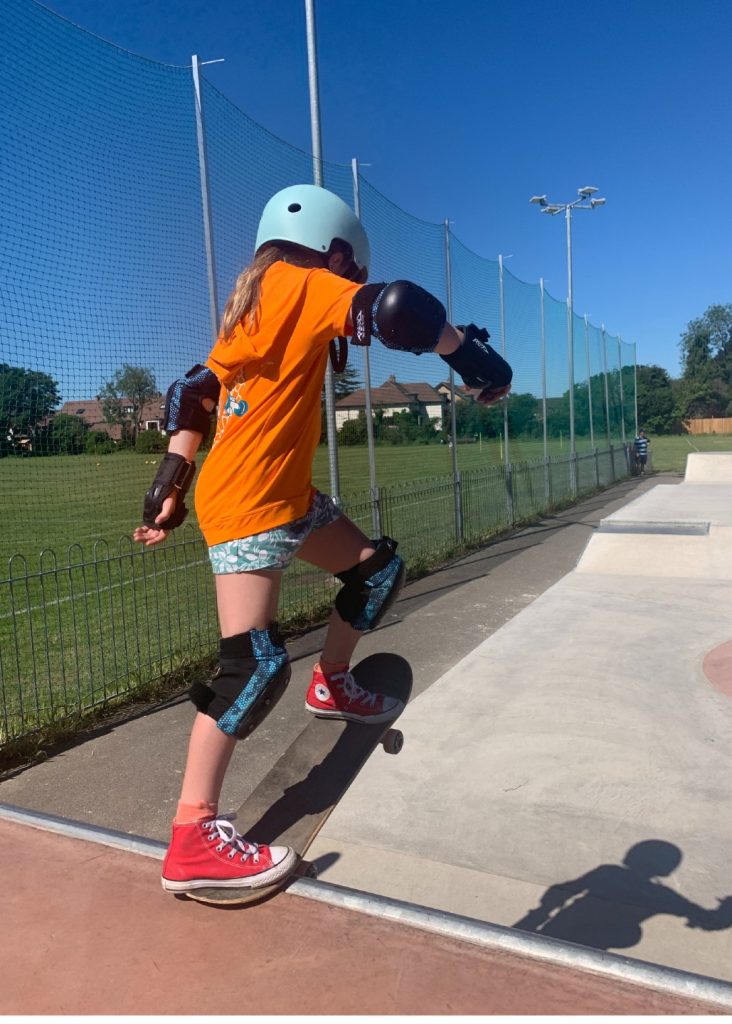Alexa & Kate – Living on the board
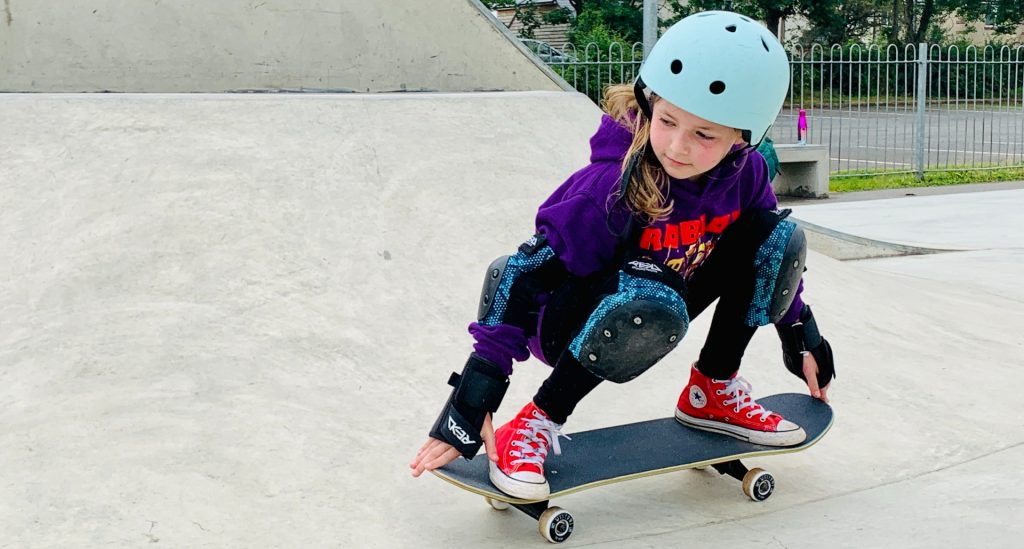
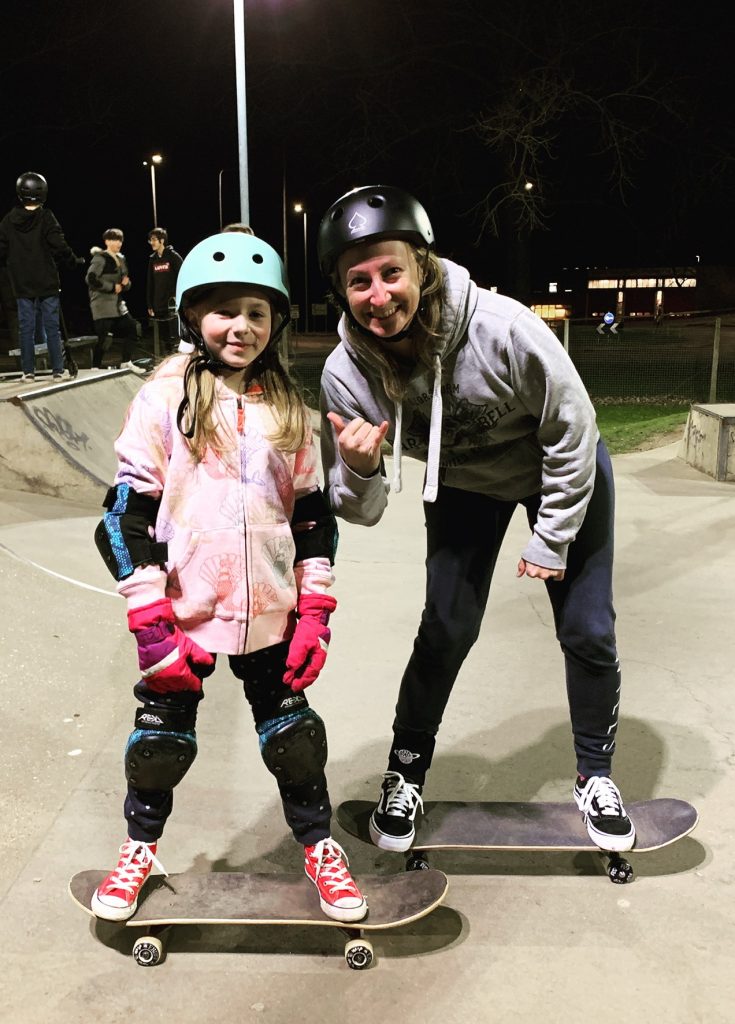
“Straight away, she was pretty much living on the board.”
As skateboarding made its debut at the Olympics at Tokyo, the Footwork magazine spoke with Alexa – a top young skateboarding talent – and her mum, Kate. At just 9 years old, Alexa has already set her sights firmly on a future in skateboarding coaching, and has some wicked tricks under her belt.
During our chat, we spoke about how she trains, what makes her love skateboarding so much, and how she would advise anyone else to build up their confidence.
How did you first get into skateboarding?
Alexa: “One of my favourite YouTubers (Flamingo) did skateboarding, and I thought it looked really cool. So for my birthday, I asked my mum for a skateboard, and that’s how I got into it.”
Kate: “Just pestering us to take you out constantly, weren’t you?
“Straight away, she was pretty much living on the board. And if she wasn’t outside skateboarding, if the weather was bad, she’d be skateboarding inside in the lounge.”
What’s your favourite trick?
Alexa: “At the moment it’s ‘Rock to Fakies’, but then when I learn a new one it’ll probably be that.”
Kate: “You’re working on ‘Rock and Rolls’, which is what you’re trying to learn right now. And you’re really nearly there.”
Alexa: “Rock and Rolls are like a Rock to Fakie. It’s kinda hard to explain, but a Rock to Fakie is like going up a ramp, there’s some coping, and then your wheels just go over that a little bit. I’m working on a Rock and Roll, but instead of faking, after your wheels have gone up, you kind of kick-turn out of it.”
What would you say to someone who wanted to get into skateboarding?
Alexa: “I’d probably help them with the basics and stuff, and tell them to wear pads and a helmet!
“Start on the flat with someone else helping, because that’s what I did when I first started skateboarding. And I had a lot of help from my parents.”
Do you get scared when you’re doing it?
Alexa: “Oh yeah!”
Kate: “That’s your favourite catchphrase isn’t it, ‘Oh my god that’s terrifying!’”
-
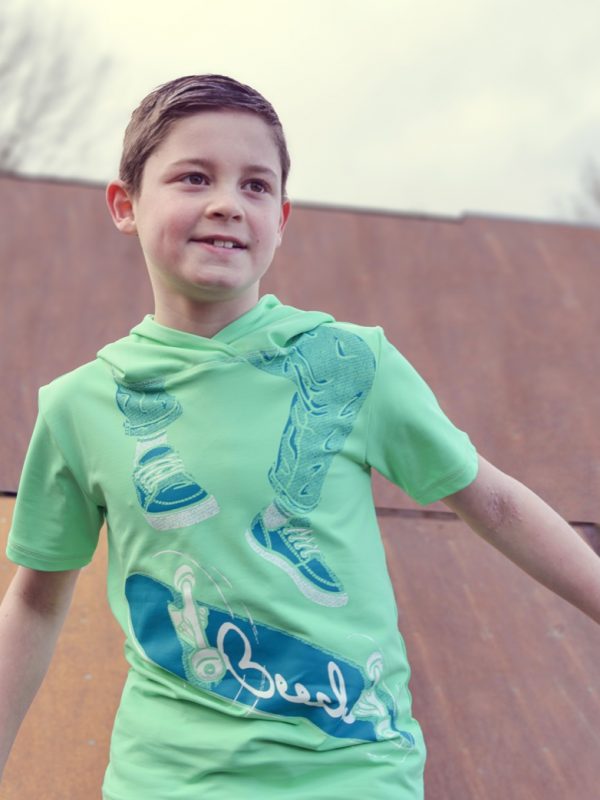 Quick ViewAdd to Shopping Bag
Quick ViewAdd to Shopping Bag -
-
 Quick ViewAdd to Shopping Bag
Quick ViewAdd to Shopping Bag
What’s your favourite thing about skateboarding?
Alexa: “Probably meeting other cool skateboarders and just having fun, really. Normally I get to meet a lot of people there.”
Kate: “There’s always people there, at the skatepark.”
Alexa: “There’s a lot of different ages, like once I got to skate with some older guys.”
Kate: “These guys would have been in their 40s and they ended up skating with her. And that’s the skateboarding community, it’s really friendly and everybody helps everybody.”
What’s your weekly practice routine?
Alexa: “We just really go at random times in the week, when we have time, we don’t really have a set routine.
“I do skate club sometimes, and I have private lessons as well.”
Kate: “It was about 6 weeks after you started skateboarding that you started having lessons.
“When it was COVID, we would always be at the skatepark early in the morning before anyone else got there and then again late at night, because obviously it gets busy during the day. Now you’re back at school, it’s kind of whenever you’re free in the evenings, and whenever the weather’s good.
“Skate club is once every couple of weeks, and you have a lesson once every couple of weeks as well. So you’ll see your coach once a week.
“She really gets a lot of benefit out of those sessions. When she’s skating with the other kids, they all just bounce off each other. Or, if she finds that she needs to work on a certain trick, that one to one just gives her that flexibility.”
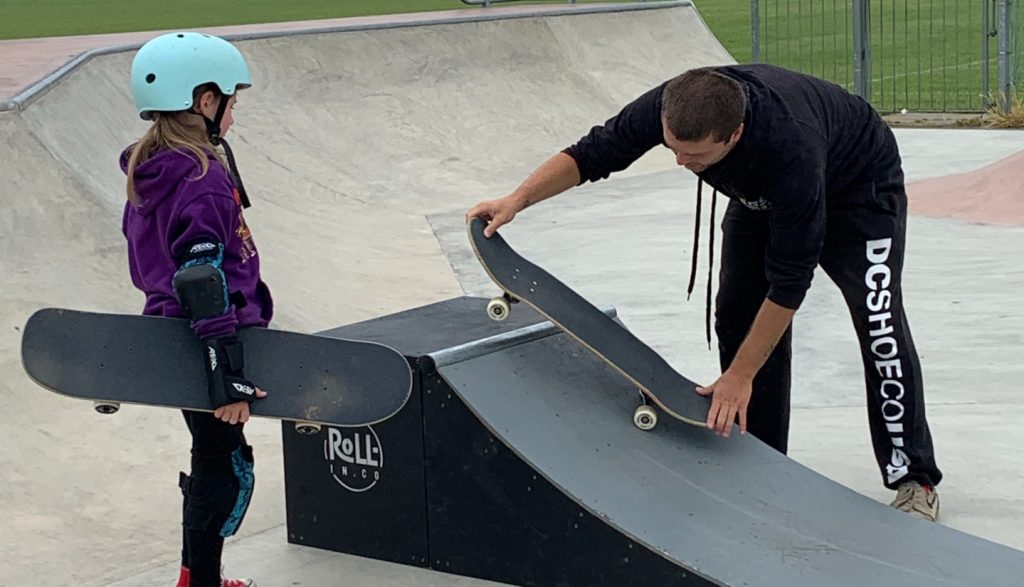
What do you normally do in the coaching sessions?
Kate: “She’ll normally spend 5-10 minutes just warming herself up and doing what she’s comfortable with, and then he’ll get her to start pushing herself, and doing stuff that she’s a little more wary of, or stuff that’s new to her, and drilling in getting the drills in for techniques that she’s already got, just to keep on top of those. And then they’ll work on different aspects, so she had one session this morning and that was all working on the Rock and Rolls.”
Alexa: “It makes me feel a lot more confident.”
Kate: “I’ve been at the skate park with her before, and she’s gone, ‘I want to do that, how can I do that?’, and I’ve just gone, ‘I don’t know! Trial and error?!’ I haven’t got a clue.
“I thought she was going to be one of those that got on a skateboard, thought ‘Oh no, that’s too hard’, and then never got on it again. So she really took us by surprise with that, because I’ve never seen the determination, in anything that she’s ever done, that she has with skateboarding.
“Obviously skateboarding you’re always falling, you’re always crashing, and you fall more often than not. So, it’s so frustrating and hard and they’ve got to get used to the disappointment, but the excitement they get when they finally nail a new trick, it’s good isn’t it.”
Where would you like to take your skateboarding in the future?
Alexa: “I’d probably want to become a skateboarding coach. I’d like to have my own skate park, and teach kids.
“It would probably be more coaching than competitions, because competitions aren’t really my thing. Because they make me really nervous!”
Kate: “She just likes skating for fun and helping others, really.”
And do you have any inspirations or favourite skateboarders?
Alexa: “With the skateboarding lessons I do, the person who teaches me was my inspiration to become a skateboarding coach. He teaches me to do a lot of things as well.”
Kate: “He gives you a lot of confidence doesn’t he, Jason.
“He runs Let’s Go Skate and he coaches loads of kids, and yeah, he’s really good, isn’t he.
“At the moment, because you didn’t get into it until January, there’s not really been any competitions or anything on (because of COVID). But the Olympics will be really good, because obviously Sky (Sky Brown) who you really like is riding.”
“I’d probably want to become a skateboarding coach. I’d like to have my own skate park, and teach kids."
“Give them any opportunity they can to get out and pursue whatever they love."
How did it feel to get back into skateboarding after your injury?
Alexa: “I broke my wrist in March when I was skateboarding, and I was very excited to get back into skateboarding after the injury, because the first thing I said after the injury was how I was worried about not being able to skateboard.”
Kate: “Her first reaction was, ‘No it can’t be broken, because that’ll mean I can’t skateboard’!”
Alexa: “I was SUPER excited to get back into skateboarding after the injury, but also nervous still.”
So how did you overcome the nerves?
Alexa: “I just started small and kept building up to things. It was a bit hard to get back on the board.”
Kate: “The dropping in was a big thing for you, that was a big fear. But then you had a lesson on that, and Jason helped you through it. There were lots of tears, and frustrations, weren’t there.
“It was a long eight weeks of her being off the board, she was getting really frustrated!”
What advice would you give to a parent whose child started to show a sporting talent?
Kate: “Give them any opportunity they can to get out and pursue whatever they love. There’s a fine line between pushing them so hard that they don’t enjoy it anymore, and pushing them past a slight fear or slight hesitation about doing something new, and pushing them past that so that they start loving it.
“But every child’s different, and I think it’s just about giving them every opportunity possible. Just help, support and encourage them, that’s all you can do really. Just get out with them and spend time with them.
“It’s one of those sports which used to have a bad rep. You’d talk about a skate park, and people would just think of groups of yobs hanging around smoking and drinking. But actually, with most of the places we’ve been to, the people are just there to skate and have fun, and there’s lots of new parks popping up, which is great.”
Alexa: “Just with my mental health, it’s helped getting out because like, sometimes, when COVID was around, I had nothing to get out for. I didn’t really want to go out in the garden, because I couldn’t see any of my friends or anything, and normally when I go out, I want to go and see my friends. So when I couldn’t see them, and without talking to them, I struggled a bit.
“And then when I started skateboarding, I made a bunch of new friends, and it made me a lot more happy.”
Kate: “I think when you achieve stuff, no matter what sport you do, it helps with your self-confidence, teaches you perseverance, determination, that hard work will pay off, I think it’s helped you in a lot of ways with your confidence.
“Especially over COVID, when all of the kids were struggling with not seeing anyone. You could see that they got a bit withdrawn, and then we got her out on a skateboard and it was like a different child again.
“You could see her starting to laugh and just being outdoors, I think it just does wonders for their self-confidence. They feel fit, they’ve got something that they can show their friends, they make loads of new friends and they all kind of help each other. Being part of Let’s Go Skate has been fab, because you get kids all at similar levels, and they all just really help each other out.”
